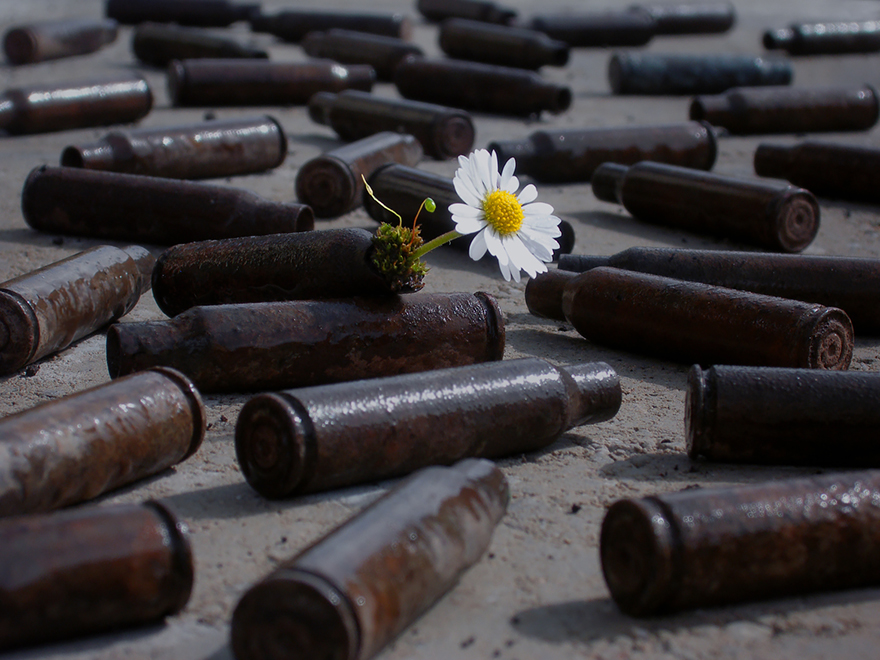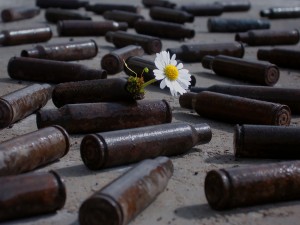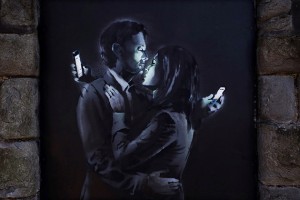Inquiry:
“How can we train ourselves to look past the superficial?”
In Brent’s case, to look past the superficial, he had to completely distance himself from society. He had to escape from those who only saw the superficial, the tangible. Although, it was not Brent who made the decision to leave society. After the crash, he felt that he “was no longer of their kind and never would be,” (p. 36). Due to the way he thought people saw him, he distanced himself from people and society and focused on his own deeds. When Mrs. Zamora employs him to build the whirligigs, he travels the country completely alone, talking to virtually no one (“By now, he was accustomed to feeling separate from the other passengers. For them, the bus was an interlude. For him, it was home.” P. 64). By distancing himself from other people, he learned to appreciate the silence that nature offered him, and felt irritable in crowded place (At the bed-and-breakfast in Maine: “He preferred the less demanding social life of the bus and restaurants and motels. He’d have rather been out in the country as well, waking to the ocean instead of to the garbage truck below his window.” P. 116).This is actually a surprisingly popular method of training yourself to look past the tangible – meditation being the most common example. Many people prefer to meditate, if they do, outside and away from the hustle and bustle of the crowds.
This is actually a surprisingly popular method of training yourself to look past the tangible – meditation being the most common example. Many people prefer to meditate, if they do, outside and away from the hustle and bustle of the crowds.
However, in the case of Stephanie in the second chapter, it took a lot of peer pressure from her friend, Alexandra, and a glimmer of hope for her to see past the tangible. Originally, Stephanie was a very scientific, logical person who thought of Alexandra’s  expeditions as trifle. However, when Alexandra takes her on the guided imagery tour, Stephanie does not have patience until there is the hope that it just may happen; “Had her words lured a mate already? Impossible, I thought. I was still five-foot-one. But what else would bring someone to the point in that weather? Disbelieving, fearful, hopeful, I slowly turned my head and stared,” (p. 32). Alexandra had gone on a rant about the “power of the wind” (p. 26) , and although skeptical, Stephanie had had the courage to begin believing in the unseen forces, in the intangible, and it brought great things her way (Kyle – p. 32). As we already know, unadulterated hope is quite the force. Great, historical things happen because someone had hope that they could – they saw a better future. Take the Apollo NASA missions, for example. These missions came to be with not only the desire to stick on to the Soviets, but with a team of hopeful people who believed in what they were doing. Gene Cernan, commander of the last Apollo missions left the surface of the moon with the words “We leave as we came and, God willing, as we shall return, with peace and hope for all of mankind.” Hope, belief, faith is quite the powerful, UNSEEN force, and it has brought the world great things.
expeditions as trifle. However, when Alexandra takes her on the guided imagery tour, Stephanie does not have patience until there is the hope that it just may happen; “Had her words lured a mate already? Impossible, I thought. I was still five-foot-one. But what else would bring someone to the point in that weather? Disbelieving, fearful, hopeful, I slowly turned my head and stared,” (p. 32). Alexandra had gone on a rant about the “power of the wind” (p. 26) , and although skeptical, Stephanie had had the courage to begin believing in the unseen forces, in the intangible, and it brought great things her way (Kyle – p. 32). As we already know, unadulterated hope is quite the force. Great, historical things happen because someone had hope that they could – they saw a better future. Take the Apollo NASA missions, for example. These missions came to be with not only the desire to stick on to the Soviets, but with a team of hopeful people who believed in what they were doing. Gene Cernan, commander of the last Apollo missions left the surface of the moon with the words “We leave as we came and, God willing, as we shall return, with peace and hope for all of mankind.” Hope, belief, faith is quite the powerful, UNSEEN force, and it has brought the world great things.
Moving on…
Most people do, at some point, go through something that changes their viewpoint on their world and lets them see past the superficial. Most self-help books are all about a tragedy that the author has been through that helped them realize whatever it is they’re writing about. Personally, I went from being attached at the hip to my phone and constantly checking Instagram to having a wider view of the world after travelling to East Africa on a volunteer trip. It turns out living in a tent without plumbing or electricity for three weeks gives you a pretty solid perspective on Western society and how reliant we are on our material objects. For me, it took meeting people who live in extreme poverty, yet know that as long as they have their families, friends, and hope, they will survive to be able to appreciate the things I cannot see nor touch. Stephanie realized this with the help of Alexandra and pure, unadulterated hope, and Brent by leaving society as a whole and seeing a whole different side of the world he had never explored before.
Note: for the image dedicated to the second paragraph, I chose a photo of a wind turbine for two reasons. 1: It’s really difficult to find an image to represent unseen forces for pretty obvious reasons. I ended up with a lot of photos for a board game. 2: Wind turbines produce electricity, which keeps things moving forward and functioning. And although we cannot see individual atoms reacting to each other, we can see their effects and how they impact our lives. So even if we can’t see it, we know it’s there and we know it makes our lives easier, better. Hence, the turbines.
This Reminds Me Of…
Typewriter Series #1487
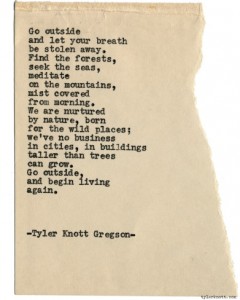 Whilst reading Whirligig, this poem came to mind, especially in the third chapter. Nature eventually plays a fairly large part in Brent’s journey, in that he begins to crave being a part of nature all the time. He chooses to camp instead of in hotels, prefers to be alone with just the earth around him and no people. His identity is “nurtured by nature” as the poem says; he grows as a person amongst the trees. Brent also avoids large cities at all costs, instead choosing to travel as close to the water as he can and leaving the city as soon as he can. He feels claustrophobic and fretful when surrounded by large buildings and many people, and chooses to go to the forest.
Whilst reading Whirligig, this poem came to mind, especially in the third chapter. Nature eventually plays a fairly large part in Brent’s journey, in that he begins to crave being a part of nature all the time. He chooses to camp instead of in hotels, prefers to be alone with just the earth around him and no people. His identity is “nurtured by nature” as the poem says; he grows as a person amongst the trees. Brent also avoids large cities at all costs, instead choosing to travel as close to the water as he can and leaving the city as soon as he can. He feels claustrophobic and fretful when surrounded by large buildings and many people, and chooses to go to the forest.
After the crash, before he went on the Whirligig Trip, Brent was almost a shell of a person. Feeling nothing, yet fragile. He didn’t interact with people, he showed remorse, but he was not living his life – possibly rightfully so, depends on your opinion. He felt identified by the crash and didn’t know what to do once he had been segregated as “different” more than ever before. He just was not living – until he went to nature. When he became independent from the expectations around him and felt comfortable in the forests he had seldom known, he started growing as a person and living.
Brent also sticks to coastal cities, which are (in)famous for being pretty eccentric. San Francisco is about as different from Chicago as it can possibly be. Where there is water, there is life and art and a sense of freedom that you just can’t find in the Mid-United States. I kind of want to recommend Vancouver as a place to visit for Brent…
Allusions:
“Brent felt he’d gained a glimpse of Olympus.” (p. 9) & “… settled on the peak the cyclist had told him was Mount Olympus. The home of the Greek gods, mused Brent. Hadn’t Hercules likewise performed his labours to cleanse himself of a crime?” (p.52)
 These two quotes feature the same allusion, yet they symbolize very different things. Just fifty pages in, we can see Brent has undergone character development, and the theme of self-identity is coming into view. Originally, Brent thought of Mount Olympus as the Land of the Popular Kids. His version of Paradise, of the ultimate reward, was to be considered cool. After the crash, after so many things are thrown violently into perspective, Olympus becomes nature. It becomes natural beauty, and he is not about to compare himself to the gods. Instead, he mentions Hercules, a mythical demigod, renowned for his strength, who had to perform his godly labours to pay for his misdeeds. Brent is essentially doing the same thing – performing assigned tasks to pay for his mistakes. As Brent had been originally comparing himself to the Popular Kids, such as Chad and Brianna – the “Gods” – he isn’t anymore. He isn’t even comparing himself to Hercules! He’s making connections from his situation to another, and sees himself as equal. It also might be deliberate that Brent references GREEK mythology, as Greek mythology is all about balance and justice, unlike Roman, which is more focused on getting ahead and more is better.
These two quotes feature the same allusion, yet they symbolize very different things. Just fifty pages in, we can see Brent has undergone character development, and the theme of self-identity is coming into view. Originally, Brent thought of Mount Olympus as the Land of the Popular Kids. His version of Paradise, of the ultimate reward, was to be considered cool. After the crash, after so many things are thrown violently into perspective, Olympus becomes nature. It becomes natural beauty, and he is not about to compare himself to the gods. Instead, he mentions Hercules, a mythical demigod, renowned for his strength, who had to perform his godly labours to pay for his misdeeds. Brent is essentially doing the same thing – performing assigned tasks to pay for his mistakes. As Brent had been originally comparing himself to the Popular Kids, such as Chad and Brianna – the “Gods” – he isn’t anymore. He isn’t even comparing himself to Hercules! He’s making connections from his situation to another, and sees himself as equal. It also might be deliberate that Brent references GREEK mythology, as Greek mythology is all about balance and justice, unlike Roman, which is more focused on getting ahead and more is better.
“… then confirmed this astonishing fact by naming every city he could remember on the four bus trips that brought him there, his geographical Genesis.” (p. 118)
In the Bible, Genesis is the book of creation, where everything started, where everything changed forever. Brent’s Genesis is written in his whirligigs, dotted around the country, each growing with more skill as Brent grows his identity. Before the crash, Brent 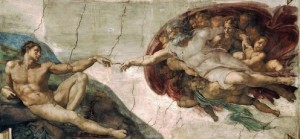 adopted whatever personality he could, whichever he believed would make him fit in. Suddenly, his life had become defined by the crash, and while he sets out seeking redemption, he creates himself along the way. This quote, while about a journey, enforces the theme of identity.
adopted whatever personality he could, whichever he believed would make him fit in. Suddenly, his life had become defined by the crash, and while he sets out seeking redemption, he creates himself along the way. This quote, while about a journey, enforces the theme of identity.
Note: I chose the painting of God creating Adam because I think that it represents Brent creating himself, his identity. God is circumstance, he is Adam, he is developing an image of the world around him and of himself.
“He claimed one of the rockers, took out his harmonica, and began work on memorizing ‘My Bonnie Lies Over the Ocean’. He now saw it for the lament it was.” (p. 75)
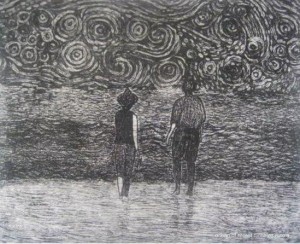 The song Brent mentions is a song about wishing for someone who has long since passed, and regretting the way things played out. At this point in the novel, Brent is still feeling deep regret for his role in the crash and sorrow for Lea. The quote and the song represent half of the restorative justice theme, the path to achieving balance in the world. In the song, the singer speaks of troubles they have encountered. Things were good – Bonnie was there, his family was alive – until they weren’t. The song ends with the line “Now look at the shape I’m in.” It’s fitting for Brent, I think, because his life had been flipped upside down and sideways and he isn’t too sure where he fits anymore. However, unlike the song, Brent does not wish for things to go back to where they were. He regrets his life before and leading up to the crash, and is simply trying to build it up again. It is not until the end of the book when he feels comfortable entering society again, therefore this quote serves as an excellent symbol of the half-way point – the midway in the Hero’s Journey, in restorative justice, in reaching balance.
The song Brent mentions is a song about wishing for someone who has long since passed, and regretting the way things played out. At this point in the novel, Brent is still feeling deep regret for his role in the crash and sorrow for Lea. The quote and the song represent half of the restorative justice theme, the path to achieving balance in the world. In the song, the singer speaks of troubles they have encountered. Things were good – Bonnie was there, his family was alive – until they weren’t. The song ends with the line “Now look at the shape I’m in.” It’s fitting for Brent, I think, because his life had been flipped upside down and sideways and he isn’t too sure where he fits anymore. However, unlike the song, Brent does not wish for things to go back to where they were. He regrets his life before and leading up to the crash, and is simply trying to build it up again. It is not until the end of the book when he feels comfortable entering society again, therefore this quote serves as an excellent symbol of the half-way point – the midway in the Hero’s Journey, in restorative justice, in reaching balance.
Note: The image attached to this is called “An Ocean of Regret”, and it’s by Nicholas Nicola. Searches for “My Bonnie Lies Over the Ocean” gave me sheet music and cartoons – I like this one better. It’s dark, it’s about regret, it features a slight theme of connection, and they are heading into the great unknown. I think it does as good a job as any in symbolizing the song and reinforcing my point.
NOTE: Some of the images included in the presentation could not be uploaded to the edublog for various reasons, so I have attached the PPT below.
Whirligig

